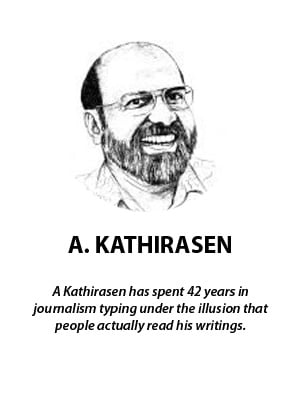
It was to have started with a big bang and put Malaysia on the world reading map. It could also have mitigated at least a little of the damaging publicity generated by the massive 1MDB scandal.
People everywhere would have realised that beyond the Malaysian crooks who cook the books, this multicultural nation has thousands of book lovers.
But it didn’t happen. An invisible virus named SARS-CoV-2 has seen to that.
Kuala Lumpur, you see, is this year’s World Book Capital. I was looking forward to visiting book exhibitions and book sales, and I expected a series of activities and talks where people would congregate and share their love for books.
But Covid-19, which has taken so many lives and destroyed so many livelihoods and jobs, has also severely crippled the Kuala Lumpur World Book Capital 2020 (KLWBC2020).
The organisers had planned many activities around Dataran Merdeka and its surroundings, including a KLWBC2020 Run – for which medals and t-shirts were made – and a national level conference of librarians which was scheduled for April 22.
I feel sad for Malaysian book lovers who had enthusiastically anticipated jumping into the activities planned, and I feel sorry for the organisers who had put so much effort into it.
Malaysia made an official bid to be this year’s World Book Capital in 2018, but preparations for it – including submitting documents to show why KL was better than other cities – began in 2016. In September 2018, the director-general of Unesco, Audrey Azoulay, announced that KL had outbid eight other cities. One reason for this was because Malaysia had highlighted the multicultural nature of the nation and the diversity of languages, which translates into a diversity of books and activities.
The KLWBC2020 secretariat planned a grand opening ceremony for April 23, which is World Book and Copyright Day. The prime minister was slated to open it in the presence of representatives of various nations and top Unesco officials. The secretariat also lined up 312 activities until April 22 next year.
But the virus began spreading and the movement control order (MCO) came into force in March and that was the end of that plan.
Like almost everything else during these bleak times, the official opening of KLWBC2020 went virtual, with recorded messages from the coordinator of the World Book Capital programme, Ian Denison, and Kuala Lumpur mayor Nor Hisham Ahmad Dahlan.
The Kuala Lumpur International Book Fair also went online this year, from June 25 to July 8. I didn’t participate because I need to hold books, feel them and smell them. A virtual book fair just doesn’t have the atmosphere. I do occasionally read books online, but an online fair is no fair.
The KLWBC2020 secretariat, led by officials of Kuala Lumpur City Hall, has representatives from agencies and organisations such as the National Library, the National Book Council, the Malaysian Book Publishers Association and the Librarians Association of Malaysia.
A KLWBC2020 secretariat spokesman told me the MCO forced them to become more creative in implementing the programme and they fully embraced social media.
One secretariat member said: “We were caught off guard but it is a blessing in disguise as we are reaching more people via social media. Nothing beats face to face activity of course, but through social media we are reaching more people in more areas.
“We were surprised at the reception to one virtual workshop on writing, publishing and marketing which was held during the month of Ramadan. Usually during Ramadan there is no activity, but more than 2,000 people participated in the virtual workshop organised by an NGO. Mind you, each participant had to pay RM99.
“It was conducted in Bahasa Malaysia, entirely on Facebook. There were also participants from outside Malaysia.”
The secretariat has been organising activities such as online storytelling contests, discussions, forums, and poster drawing and poetry competitions. So far, I am told, they have carried out 266 programmes, most of them in Bahasa Malaysia and a few in English.
Sad to say, I hadn’t heard of these activities until they told me but that is probably because I’m not so much of a social media person. But, several younger persons I spoke to told me they too did not know of these programmes being run by the KLWBC2020 secretariat.
The spokesman said once the restrictions on movement were lifted, they would implement activities involving physical interaction among readers.
I am told at least two of the Go-KL buses now allow users to access books and magazines online. What this means is that you can read part of a book or an article or two while riding the bus. They plan to introduce this facility to more buses.
The secretariat is also beginning to set up book kiosks in various parts of Kuala Lumpur.
I am happy to report that there is a digital library service now called u-Pustaka. Anyone can borrow books from a consortium of 12 libraries by using the postal service. This is good news for those who like to handle physical books. Those who are comfortable reading online can also access 33,426 e-books and 4,964 magazine titles.
The organisers – through the National Library and the Kuala Lumpur Library – have made more online books available to the reading public and they are seeing a spike in readership.
“More people are borrowing books online and we see a tremendous increase in the number of people who have taken up reading during the Covid-19 pandemic,” said the KLWBC2020 secretariat spokesman.
Well, at least some good has come out of it. - FMT



No comments:
Post a Comment
Note: Only a member of this blog may post a comment.